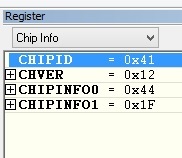Other Parts Discussed in Thread: CC2541, CC2540
I am having a problem during certification of our product with Bluetooth module CC2541 and CC2540. We conducted LE RF-PHY conformance certification in test house, and all the modules came back with % of maximum frequency deviation <185KHz less than 99.9% (Result show below). According to test house this is a fail.
We are closely following the sensor tag reference design. The firmware used is the HostTestApp from TI, which was part of BLE stack v1.40. Crystal is 10ppm stable and test temperature is 20 degC. Could you point to any reason for the failure.
TX Freq | Payload |
(MHz) | Pattern | Test Criteria | Value | Unit | Limit |Result | Test Status
--------------------------------------------------------------------------------------------------------------------
2480 | 10101010 | Max Freq Dev(Δƒ2) < 185 kHz | 99.76 | % | >= 99.9 | FAIL | Already failed

The ChipID and CHVER are above
The power supply stability is captured below
AC coupled - 20mV/div
DC coupled 500mV/div
The schematic can be made available on request (not public). The schematic and layout very closely follow keyfob reference design.
We have thousands of units waiting for your answer. Our production is really stalled because of the issue.



